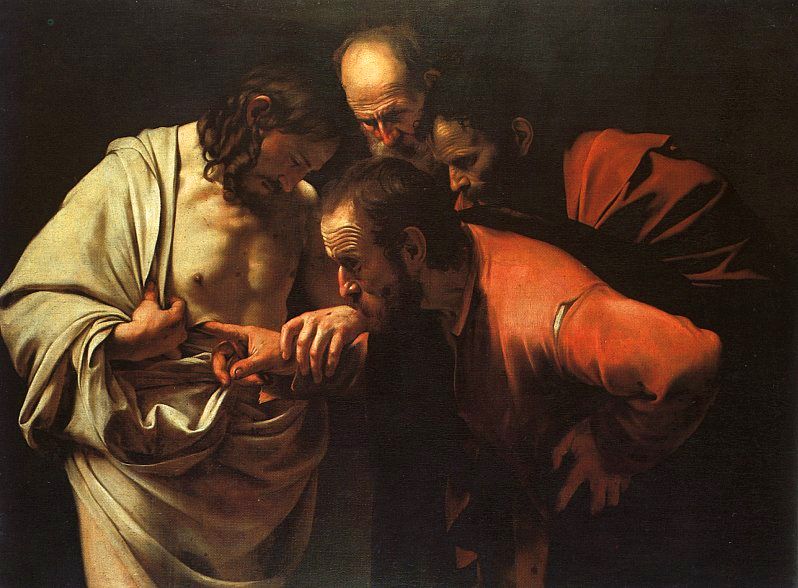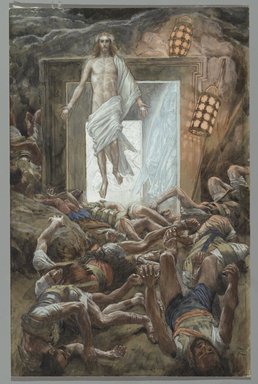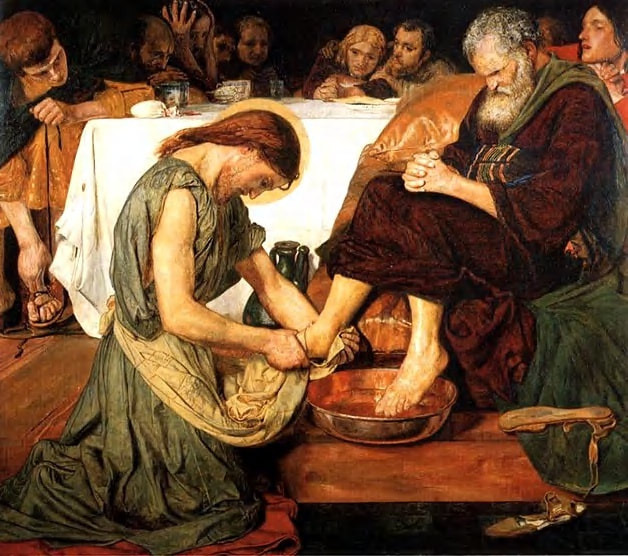John 10:11-18
April 26, 2020
Jesus calls himself the Good Shepherd. What does this mean? First, it means that Jesus is the Lord God. In our Old Testament Lesson from Ezekiel 34, the LORD God said that it was He who would shepherd the sheep, seek the lost, bring back the strayed, bind up the injured, and strengthen the weak. The Lord God himself would be their shepherd and lead them to pasture to feed. And King David declared in probably the most well-known Psalm, “The Lord is my Shepherd.” When Jesus calls himself the Good Shepherd, he is claiming to be nothing less than the Lord God himself!
Second, that Jesus calls himself the Good Shepherd means that he lays down his life for the sheep. This seems strange, because shepherds generally don’t lay down their lives for their sheep. Rather, they use their sheep for their own benefit. They sheer them, milk them, and butcher them for their meet. They don’t willingly die for the sake of the sheep. But when Jesus calls himself the Good Shepherd, he is not likening himself to any shepherd on earth. Jesus does what no shepherd, good or bad by worldly standards, would ever do. He lays down his life for his sheep!
Indeed, this is what makes him the Good Shepherd! Jesus says, “I am the Good Shepherd. The Good Shepherd lays down his life for the sheep.” This is what the Good Shepherd does. If your good shepherd doesn’t lay down his life for you, then he’s not the Good Shepherd. Jesus says, “For this reason the Father loves me, because I lay down my life, so that I may take it up again.” This shows how thoroughly Jesus’ will conforms to his heavenly Father’s. The Father and the Son are on the same page. They desire the salvation of mankind. They know what it takes to save us. The Father sends the Son. The Son goes willingly.
This means that as Jesus hung on the cross in anguish, bearing the sins of the whole world, he knew that what he was doing was pleasing to his Father. As the Father poured out his wrath against sin upon his Son, he was pleased with his Son’s work of redemption! The Father himself loves us! That is why he sent Jesus to die for us.
Jesus’ sheep are human sheep. They are precious in his eyes. This is why he took on our own flesh and blood, assumed a human soul, so that he might save everything we are. Jesus is forever one of us. He is a human being. He has joined his flock. And he has died for his flock. This is what it means that our Shepherd is Good.
Finally, that Jesus is the Good Shepherd means that he tends his sheep. He cares for us today. Jesus’ ministry continues today. It has not ceased since it began. It carries on through the ministry of the Word. Jesus has done the work. He has laid down his life for us. We receive his victory over death by believing in him. Jesus says, “Blessed are those who have not seen, yet, have believed.” But we can’t believe unless we hear. We need to hear Jesus’ voice.
Jesus is the Good Shepherd. That means that we are sheep. What does this mean? Well, it means we have gone astray. “All we like sheep have gone astray. We have turned, everyone, to his own way. And the Lord laid on him the iniquity of us all.” Sheep need a shepherd, or else they’ll go astray. They can’t be left to their own devises or they will get themselves into trouble. Each to his own way, eventually leads to death and damnation. We have gone astray. Jesus needed to find us. We didn’t seek him out. Jesus needed to save us. We couldn’t save ourselves. Jesus laid down his life for us to make atonement for our wayward ways. We need to be saved. Only the Good Shepherd saves.
We are sheep. This means that we listen to the voice of our Good Shepherd. Sheep are not trusting animals, and they shouldn’t be. They have no defense against predators and thieves, except to listen to the voice of their shepherd and stay close to him. Sheep will not follow the voice of a stranger. Jesus says, “A stranger they will not follow, but they will flee from him, for they do not know the voice of strangers.” Jesus’ sheep flee from strangers. This is because, Jesus teaches them to. Jesus says, “Beware of false prophets, who come to you in sheep’s clothing but inwardly are ravenous wolves. You will know them by their fruits.” Jesus’ sheep know false prophets by what they teach.
Sheep don’t follow strangers, not because they recognize all the strangers’ voices. They don’t follow strangers, because they recognize the voice of their own shepherd. They know their shepherd’s voice so well, that even if someone tries to imitate it, they’ll recognize that it doesn’t match and they will not follow. This is how Christians are. Christians listen to the voice of their Shepherd Jesus. They learn his word, so that they recognize when he is speaking to him. This way, if a false prophet tries to lure them away with half-truths and empty promises, they recognize that it is not the voice of their shepherd.
This is why it is so important for us Christians to constantly learn the word of God. We forget easily. And it’s not simply like forgetting knowledge that you learned in high school. The devil is constantly attacking you with false teachings, so that you will not know the voice of your shepherd. Scripture warns, “For the time is coming when people will not endure sound teaching, but having itching ears they will accumulate for themselves teachers to suit their own passions, and will turn away from listening to the truth and wander off into myths.” (2 Timothy 4:3-4) And aren’t we seeing this happen before our eyes! How many churches today teach something unrecognizable from what they taught 100, 50, or even 20 years ago? People accumulate for themselves false teachers, that scratch where they itch.
How many hours a week do you listen to the radio? Watch TV? Watch videos or read secular articles on the internet? Talk with friends and family, who listen to the radio, watch TV, and cruise the internet? Do these voices affect what you believe? How many hours a week do you read your Bible or Catechism? Listen to the Word of God at Church or Bible Study? Discuss the Word of God with your family and friends? Which voice affects you more?
And this shows us another thing that we need, because we are sheep. We need to be tended. Many people treat Jesus and the Church where his Word is proclaimed the way they would treat a financial advisor or a doctor. I’ll listen to him when I need him. But you need Jesus every day. You need him to guide you with his staff and rod, to lead you beside still waters and on the path of righteousness. This means that you need the Law to be preached to you, so that you repent of your sins, to listen to the Gospel, believe it, and conform your life to Christ. Only by listening to the words of Christ can you recognize the lies that come from the world, which whirl around in such cacophony orchestrated by Satan in order to drown out the voice of your Good Shepherd. Yet, if you know the voice of your Shepherd, no matter whole loudly the Devil and his wolves howl, you will hear the clear voice of Jesus pierce through the noise.
How does Jesus tend us today? Through his Word. When you hear Jesus’ word, you hear Jesus’ voice. It is through believing in Jesus’ promise of salvation that was earned when he laid down his life for you that you inherit eternal life, into those blessed pastures. After Jesus rose from the dead, he appeared to his disciples a third time while they were fishing. As they sat on the shore after eating their breakfast of fish provided by Jesus, Jesus asked Peter three times if he loved him. Three-time, Peter assured Jesus that he did love him in stark contrast to the three times he denied Jesus the night of his betrayal. And three times Jesus commanded Peter to feed or to tend his sheep.
Jesus sends his ministers to tend his sheep by preaching and teaching his words to them; by baptizing, absolving, and distributing the Sacrament of the Altar. By rebuking sin, exhorting true Christian faith and living, and by comforting with the power of the Word of Christ. St. Paul said to the pastors in Ephesus when he took leave of them, “Pay careful attention to yourselves and to all the flock, in which the Holy Spirit has made you overseers, to care for the church of God, which he obtained with his own blood.” (Acts 20:28) Even the word “pastor” simply means shepherd.
Now, there is only one Good Shepherd, Jesus Christ. But he uses many under shepherds to care for his sheep, to feed them, keep them out of danger, and rescue them from the clutches of wolves. These under shepherds do this by proclaiming the words of Christ, which all of Jesus’ sheep gladly and willingly listen to.
Although there are many under shepherds, and many of you have had several pastors; and although there are many congregations, and many of you have been members at a number of churches, Jesus tells us there is only one flock and only one Shepherd. There is only one holy, Christian and Apostolic Church. And there is only one Lord Jesus Christ. Scripture says, “one Lord, one Faith, one Baptism, one God and Father of all.” Yet, this is not what we see. We see a divided Church; one scattered to the wind by wolves and false prophets. Not only are there numerous church buildings with different names and different customs within any town; there are numerous teachings. Under the same title of “Christian” you will hear countless different and contradictory teachings. And if you could look into the heart of many, who claim to be Christian, you would find even more false belief. How can Jesus say that there is only one flock?
Because, the Church is invisible. It is invisible, because you cannot see people’s faith. Jesus knows who his true sheep are. Yet, the Church is also visible, because it is where the voice of the true Shepherd is heard. Jesus’ flock is united through faith in the pure Gospel, which proclaims that Christ Jesus laid down his life for his sheep. This means that where the pure Gospel is preached and where the Sacraments are administered, there is Christ’s one true flock. Where the Gospel is not preached, there the Good Shepherd is not present and neither is his flock.
The voice of our Good Shepherd is the most pleasant voice we can possibly listen to. His voice gives us true peace. “Yea, though I walk through the valley of the shadow of death, I will fear no evil. For Thou art with me. Thy rod and Thy staff, they comfort me. Thou preparest a table before me in the presence of mine enemies. Thou anointest my head with oil; my cup runneth over.” How can I fear no evil as I walk through the valley of the shadow of death? How can I not be afraid, when I’m told that death is around every corner? Because, Jesus our Good Shepherd has conquered death. He came to give us life abundantly. And he did it by laying down his life for us and taking it up again. Death cannot harm us. We have a Good Shepherd, who is victorious over death. “O Death, where is your sting? O Hades, where is your victory? The sting of death is sin. And the strength of sin is the law. But thanks be to God, who gives us the victory through our Lord Jesus Christ.” Our Good Shepherd has given us victory over death even as we walk through its valley. Any voice that tells you otherwise is a wolf. But the living and risen Lord Jesus is our Shepherd. Amen.





 RSS Feed
RSS Feed